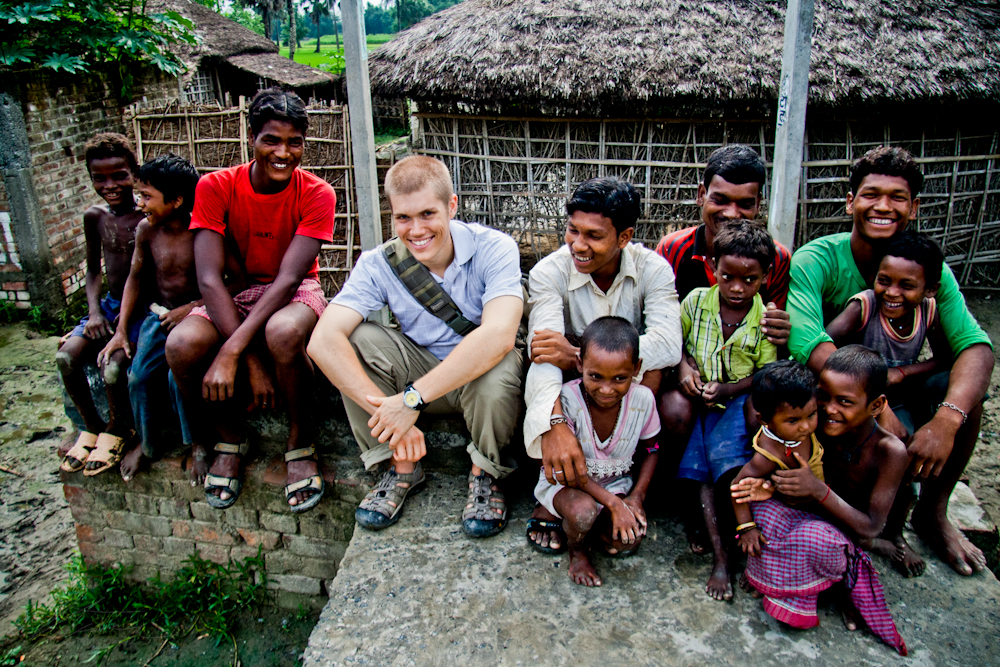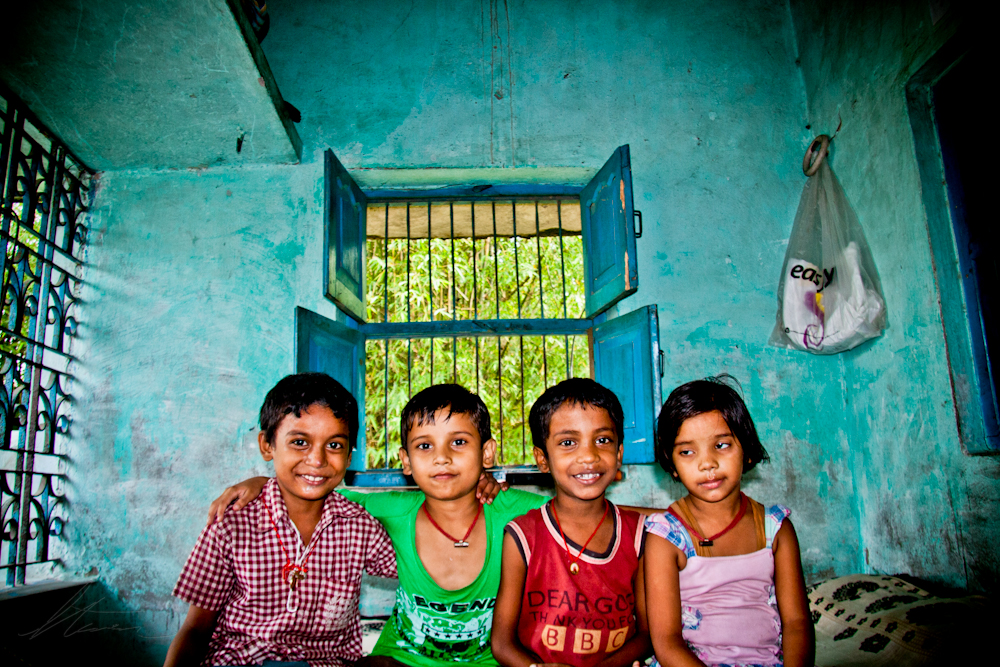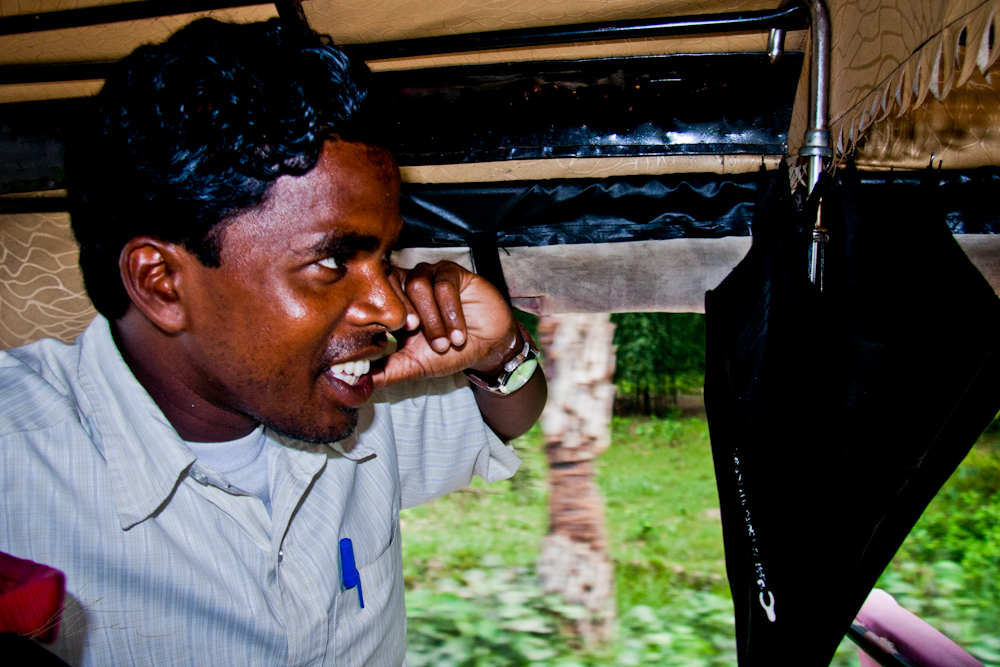
Travel Blog: Buying a train ticket and one more village visit....
India, Day 10
 I had a good times with my host in the area where I stayed in India from days 5-10. But, all good things must come to an end. The end would arrive with a much more pronounced snap than I originally expected, as will be detailed tomorrow...
I had a good times with my host in the area where I stayed in India from days 5-10. But, all good things must come to an end. The end would arrive with a much more pronounced snap than I originally expected, as will be detailed tomorrow...
This day, however, was spent in a 40km trip to the nearest big town where we bought train tickets for the next day's journey southward. Our trip to the train station almost became a debacle, though, because I had yet to learn how train travel works in India. During the middle part of the year, when most of the people in India do their work or leisure traveling, tickets are booked as long as six months in advance. Whenever anyone tries to book a ticket for next-day, or even next-month travel during the busy season, the best you can manage is a situation similar to flying standby: you are on the list, but not guaranteed a seat. And given the nature of Indian trains, there isn't always room to stand either...
I didn't learn any of this until the moment we walked into the ticket office to purchase our tickets. To the Indian culture, this is natural. To the western mindset, I couldn't understand why my host, with the knowledge of my visit, didn't book the tickets three months prior. Cultural differences, I suppose.
At any rate, our two-hour tempo ride home was punctuated by one last visit to some of the local gypsies. And, again, I was impressed by my host's fearlessness at walking into a clump of buildings and assembling a crowd from what seemed like nowhere, and we would speak to them.
Whenever I travel through India, people always ask me if it's "safe" to go to remote places to speak to the villagers. My opinion on this subject is colored a bit, because a)I loath crowded cities and love small towns and villages, and b)I was introduced to India by fearless people who taught me to be careful, but never to be fearful. And when I was in India on my own, I stayed with hosts who also exhibited no fear. And as for the people we spoke to, their response was never anything but perfect hospitality. The Indian attitude toward most encounters is to be polite and always non-confrontational, and visitors have to be extremely offensive and abrasive to raise their ire. With these factors all in play, I'm never worried.
My biggest danger in India turned out to be...myself. Come back tomorrow for the full story on how I woke up blind the next morning...
Travel Blog: India, Day 9 - More village outreach.
In my recaps of India, day eight, I began to wonder if my journal entries and camera date stamps were both out of step with the true chronology of how events transpired. It seemed impossible that so much could have occurred in a single twenty-four hour span of time. I checked and double-checked, but as best as I can tell, the day really was that packed. I have said before that my second host's primary goal, outside of the matters pertaining to his orphanage, is village outreach. In that vein, we continued on with our projects, speaking to a large group of women and children the day after our race back to the village. This was a special place for my host, as we spoke from the courtyard of his sister's house.
This project actually brought with it a pleasant surprise; that of seeing a colleague of my host's whom I had met on my first trip to India three years previous. Seeing both him and his family was an unexpected treat, and I was happy to find that they fared well.
The Village Mad Boy
India, Day 9
Today's India images are a little hard to look at.
Tim Johnson was not much more than a speck in the distance, but he was closer to us. He walked erratically, as if his right legs were shorter than his left lefts. He reminded me of a car stuck in a sand-bed.
I thought mad dogs foamed at the mouth, galloped, leaped and lunged at throats, and I thought they did it in August. Had Tim Johnson behaved thus, I would have been less frightened.
Nothing is more deadly than a deserted, waiting street. The trees were still, the mockingbirds were silent, the carpenters at Miss Maudie's house had vanished.
- To Kill a Mockingbird
This chapter from Harper Lee's opus came back to haunt me halfway through my eighth day in India. Much like Tim Johnson, the mad dog whose appearance portended the coming maelstrom in Maycomb, the arrival of this boy eclipsed every other immediate sight and sound. It was my first such encounter.
My host and I stood in the center of a village street, fresh from one of our many outreaches. The grey-brown slurry of mud had hardened in the middle but was still soft around the edges. Then, he appeared. A malnourished, heartbreaking personage. Completely naked, he half-staggered, half-shuffled down the center of the street.
"What is wrong with him?" I asked, keeping my voice low; my organic Western tendency to minimize the unpleasant suddenly reemerging in India's boldfaced culture.
My host had seen this boy before. "He is mad," was his simple reply.
I watched him come down the street. I would have been mesmerized, but I still wasn't sure if I should give the boy a wide berth. My discomfort and perverse fascination grew as the boy drew closer, then stopped, dead still in front of me. He looked at me hard. In this respect, he was like everyone else in this remote area of India: I was white and therefore a novelty.
This boy would have been memorable for his condition if his condition had been the only thing to set him apart. If that had been the case, I would have marked him down as another sad case of mental illness. The lower half of his face was filmed in the mucus from his unwiped nose, and his bony body was peppered with grains from the reapings currently drying in front of every house. But for all this, it his look held me spellbound. Because it wasn't just a look, it was a glare. There was hatred in that look; an overarching, resentful disgust for the world at large. His unblinking eyes bored into me with merciless loathing.
I do no ascribe every minor inconvenience or disagreeing circumstance to be a direct act of Satan, but I believe strongly in spiritual forces. And when I looked at this child, and he looked back with such unabashed spite, a single word came to my mind: possession. This feeling felt validated when I raised my camera to take a few closeups of the boy after he stopped in front of me. I edged closer to capture his visage, and he immediately turned away and stalked off between some huts. Even through the grey haze of his "madness," something in him did not want to be photographed.
There could be a dozen different explanations for this boy's unpleasant intensity. Perhaps he was a simple case of mental disadvantage. Perhaps there was abuse. Perhaps an occult village ceremony, performed in an attempt to correct his mental handicap, opened the unknowing child up for outright demonic possession. I'll probably never know. In the meantime, this boy stands out in my mind as one of the most remarkable encounters I had on my non-stop, episodic eighth day of my journey through India.
The first image in this series contains nudity. [nsfw]
Travel Blog: India, Day 8 - The kids at the riverbank.
While at my host's cheerful home village, an oasis in the middle of abject and depressed poverty state in India, we met a group of children doing laundry in the nearby river. Let me see...
A gaggle of village kids. India. A river. An open field of epic proportions.
Why, yes, a photo op was in order.
Every time I visit India, I am always amazed and overjoyed by the people's capacity for kindness, unhindered friendliness and hospitality, and their sheer willingness to participate. Shy though they were, this group of children stayed true to Indian hospitality by eagerly smiling and waving at the camera when I started clicking the shutter. They giggled and laughed elatedely when I turned the SLR around showed them their photos in the camera's monitor. I took dozens of photos of the little guys. I don't know what these children's lives are like on a normal day, but in that environment, with those kinds of smiles, they made this scene look absolutely idyllic.
India, Day 8 - Village Outreach
Recapping day seven took forever. It was like flying west--the day just never ends. After arriving in my second location and being greeted by the "cast of thousands" that live with my hosts, we all took a good night's sleep and were up with the sun the next morning. The day began with a group devotional before the orphans went to school. If you have never heard a group prayer in India, it's a unique thing. Everyone prays aloud simultaneously, and I have to confess that it caught me off guard when I first heard it.
Devotions over, kids at school and breakfast eaten, my host and I set off in the Bolero once again. Our project for the day was village outreach. This area is home to a myriad of transient "gypsies" who move in during the harvest seasons, live lightly on the land until the harvest is over, then move on. We went to reach out and speak with these people. We didn't take any gifts, we didn't raise a tent, we just walked up, spoke to the people, and moved on.
More than anything else, this felt like pure missions work. My host reminded me of Paul. Go into the center of a community, speak, and continue on your path. It was at this point during the trip that I began reading through the book of Acts in earnest, trying to learn from the example of Paul, whose restless and often reckless devotion to his calling has been matched by very few individuals since. This week, I would read, watch and learn.
Poverty is hard to look at, no matter where you are in the world. But poverty without hope is even worse. When you walk into a mass of crude tents to visit a people group who neither know nor have imagined a life any better than the one into which they were born, it's hard to watch. And we had nothing to offer. We couldn't make their lives any better materially, and we did not lead them to believe that we could. We simply tried to give them a little hope. I don't know what kind of impact our visits had on the people we spoke to, but we can hope that they took it to heart.












































